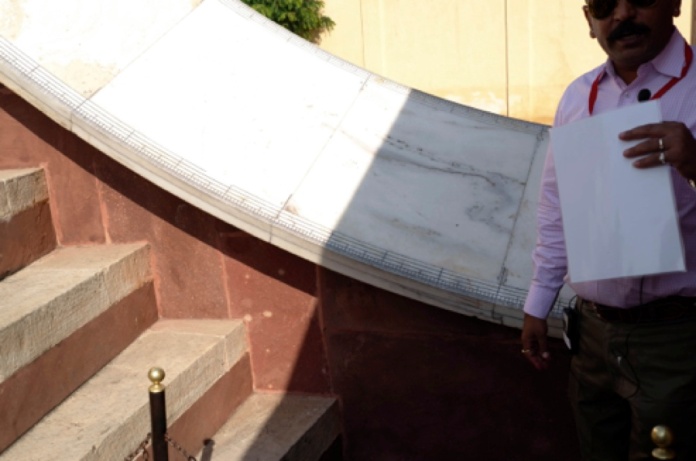We set out early today for our tour of Jaipur, led by our informative and jovial guide Devendra (a.k.a. “Dave”).
Within moments, Dave totally justified my introduction and explanation of caste in Monday’s lecture by immediately and proudly informing us that he is a Kshatriya, which, he said, explains his earrings and semi-carnivorous diet (“warriors must be strong”).
We passed the Palace of the Winds, whose many large and small windows were designed to give women of the Maharaja’s harem the chance to witness life on the streets below:
Passing a snake charmer (the snake is actually defanged) . . .
. . . and as gaggle of Indian tourist ladies . . .
. . . we entered the City Palace, the Maharaja’s royal residence, which, like many of Jaipur’s buildings is painted in the special pink of this city:
At the heart of this complex is the famed Jantar Manar, an elaborate astronomical observatory built in the mid-nineteenth century. Its mammoth instruments are designed to track time, solar equinoxes, and the movement of constellations through the heavens—all to inform astrological readings to guide royal decision making (a peculiar but all-too-typical fusion of early science and religion). Here is the huge sundial:
Here, a smaller sundial showing time to the second:
And here an array of devices each of which tracks the movement of stars through their various astrological “houses.” I’ll spare you the photo of me posing as an archer in front of the one for Sagittarius.
Afternoon was a series of visits to various jewelry and fabric centers (Jaipur is a center for both forms of artisanery and for the processing of rare gemstones). Not too much of interest here, although I did check some items off my gift list.
The real treat, which ended our visit to Jaipur was a festive evening at the Rambagh Palace. This began with a stimulating lecture by Vivian Perez, a local scholar on India’s current political and social situation. Perez noted the many problems facing India, but he also displayed a bit of optimistic nationalism: “We can see the light at the end of the tunnel,” he declared.
Drinks followed, during which the women received shawls and the men turbans. Here are three of our wonderful TCS staff, Leslie Knopfler (on left), Kyle Diercks (Marketing, along for the experience), and Lynn Garrison, the expedition leader, who, along with Leslie and John Thiede, make everything “work.” And, of course, me in my turban:
There followed a long walk across the property, accompanied by colorfully dressed hotel staff . . .
. . . to the polo field, where our mounts awaited for a full game of elephant polo.
Another wonderful Indian buffet dinner . . .
. . . and then dancing under the stars as late as our 7 AM departure would permit:
What to say? Outside the walls, life went on as always in the heat, dust and squalor of India. Our stay in the Rambagh Palace was hardly an accurate introduction to this country, but as one who has traveled through the heat, dust, and squalor (popping Cipros tablets for unavoidable intestinal disorders) and hopes to do so again, it was a pleasure for once to get inside “the palace walls.” Maharaja for a day. I hope in the future India will continue to prosper, and many more Indians, both natives and those from the vast Indian diaspora, will enjoy this place as a site for their weddings and other special occasions.


















